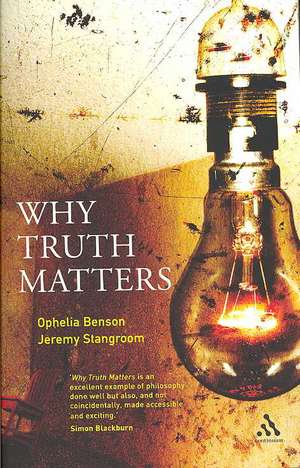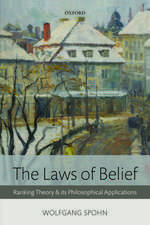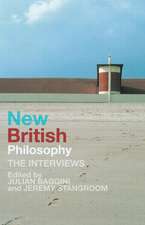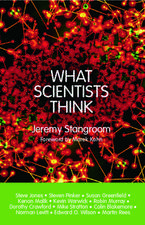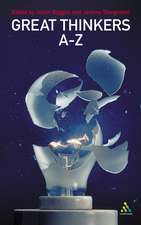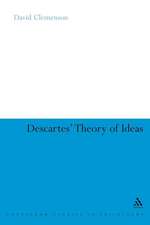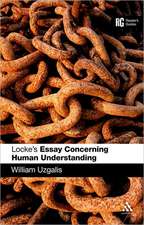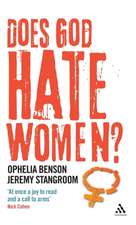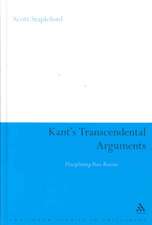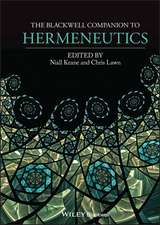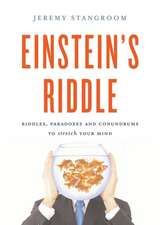Why Truth Matters
Autor Jeremy Stangroom, Ophelia Bensonen Limba Engleză Paperback – 6 iun 2007
| Toate formatele și edițiile | Preț | Express |
|---|---|---|
| Paperback (1) | 106.05 lei 43-57 zile | |
| Bloomsbury Publishing – 6 iun 2007 | 106.05 lei 43-57 zile | |
| Hardback (1) | 224.21 lei 43-57 zile | |
| Bloomsbury Publishing – 8 feb 2006 | 224.21 lei 43-57 zile |
Preț: 106.05 lei
Preț vechi: 175.76 lei
-40% Nou
Puncte Express: 159
Preț estimativ în valută:
20.29€ • 21.24$ • 16.89£
20.29€ • 21.24$ • 16.89£
Carte tipărită la comandă
Livrare economică 31 martie-14 aprilie
Preluare comenzi: 021 569.72.76
Specificații
ISBN-13: 9780826495280
ISBN-10: 0826495281
Pagini: 216
Dimensiuni: 129 x 198 x 17 mm
Greutate: 0.24 kg
Editura: Bloomsbury Publishing
Colecția Continuum
Locul publicării:London, United Kingdom
ISBN-10: 0826495281
Pagini: 216
Dimensiuni: 129 x 198 x 17 mm
Greutate: 0.24 kg
Editura: Bloomsbury Publishing
Colecția Continuum
Locul publicării:London, United Kingdom
Caracteristici
Jeremy Stangroom is co-editor of The Philosophers' Magazine and www.butterfliesandwheels.com, both ideal media for bringing the book to the attention of the intended readership
Cuprins
1. The Antinomies of Truth 2. Truth, Doubt and the Philosophers 3. The Truth Radicals 4. The Social Construction of Truth 5. Politics, Ideology and Evolutionary Biology 6. Wishful Thinking and Epistemological Confusion 7. Institutions, Academe and Truth 8. Why Truth Matters
Recenzii
In this book, Benson and Stangroom are wide-ranging in their knowledge and in the thinking about what they know, and so the books appears laid out almost like a collection of essays that are connected by the theme described above. Anthropology, evolutionary psychology and sociobiology, feminism, philosophies of various sorts, and the politics of Nazism are all touched on or addressed. Each chapter is interesting in its own right...The book is beautifully written, and sprinkled with passages of both insight and literary value.
British philosophers Ophelia Benson and Jeremy Stangroom array their immense talent ... in Why Truth Matters. What they're on about is a prevailing intellectual indifference to coherence, logic, rationality, and evidence. It's a world-view that holds that there is no historical truth and almost everything is a mere social construction. Discovery is conflated with invention, myth is elevated alongside empirical evidence, and no lines are drawn between fact and fiction....Most of us will get the main point Stangroom and Benson are making: truth matters because human beings are the only species capable of finding it out.
As polemics go, it is short and adequately pugnacious. Yet the authors do not paint their target with too broad a brush. At heart, they are old-fashioned logical empiricists -- or, perhaps, followers of Samuel Johnson, who, upon hearing of Bishop Berkeley's contention that the objective world does not exist, refuted the argument by kicking a rock. Still, Benson and Stangroom do recognize that there are numerous varieties of contemporary suspicion regarding the concept of truth....They bend over backwards in search of every plausible good intention behind postmodern epistemic skepticism. And then they kick the rock.
Selected as Prospect's 'Underrated Book of the Year 2006': In every generation, intelligent people insist on embracing the irrational. Postmodernism, identity politics and pseudoscience are easy to criticise, but hard to scorn to anything like the extent they merit. Benson and Stangroom do a heroic job of trying, and their defence of the Enlightenment ought to be better known.
A clear, accessible and hugely important account of what it is to be rational. Popular philosophy at its best.
The authors discuss philosophical notions of truth amidst broader societal and political concerns, and the most exciting passages cover the rise of social Darwinism and eugenics in a discussion about the interplay between ideology, science and politics.
mention in an article of Peter Benson, Philosophy now, 1 March 2009
The book is well-written and comprehensive either for people without a deep knowledge in philosophy.
Postmodernism is often billed as attacking truth and science. This is how it is presented in the valuable little book Why Truth Matters, by the editors of the sceptical website butterfliesandwheels.com, Ophelia Benson and Jeremy Stangroom. They mount a spirited counterattack, reminding us - in the way that Cambridge philosopher GE Moore was famous for doing - that if it comes to a battle for hearts and minds, basic convictions of common sense and science beat philosophical subtleties hands down. Where Brian King horrifies us with his liars, Benson and Stangroom reveal a parallel rogues' gallery of social constructivists, who look at how individuals and groups participate in the creation of their own perceived reality. These "rogues" include the feminist Sandra Harding and the neo-pragmatist Richard Rorty, but the doyen must surely be the French philosopher of science Bruno Latour. Latour's confusion of words and things led him to the precipice of denying that there could have been dinosaurs before the term was invented. Presumably a similar argument would show that nobody before Crick and Watson had DNA. Why Truth Matters is an excellent example of philosophy done well but also, and not coincidentally, made accessible and exciting. Truth matters, it tells us "not in a dull perfunctory dutiful sense, but in a real lived felt sense - 'on the pulses' as Keats put it".
A sassy and profound response to [a] cascade of superstition and silliness ... Benson and Stangroom answer the clotted, barely readable sentences of the postmodernists with sentences so clear you could swim in them. There should be a law demanding every purchase of a Jacques Derrida "book" be accompanied with a free copy of this shimmering, glimmering answer.
British philosophers Ophelia Benson and Jeremy Stangroom array their immense talent ... in Why Truth Matters. What they're on about is a prevailing intellectual indifference to coherence, logic, rationality, and evidence. It's a world-view that holds that there is no historical truth and almost everything is a mere social construction. Discovery is conflated with invention, myth is elevated alongside empirical evidence, and no lines are drawn between fact and fiction....Most of us will get the main point Stangroom and Benson are making: truth matters because human beings are the only species capable of finding it out.
As polemics go, it is short and adequately pugnacious. Yet the authors do not paint their target with too broad a brush. At heart, they are old-fashioned logical empiricists -- or, perhaps, followers of Samuel Johnson, who, upon hearing of Bishop Berkeley's contention that the objective world does not exist, refuted the argument by kicking a rock. Still, Benson and Stangroom do recognize that there are numerous varieties of contemporary suspicion regarding the concept of truth....They bend over backwards in search of every plausible good intention behind postmodern epistemic skepticism. And then they kick the rock.
Selected as Prospect's 'Underrated Book of the Year 2006': In every generation, intelligent people insist on embracing the irrational. Postmodernism, identity politics and pseudoscience are easy to criticise, but hard to scorn to anything like the extent they merit. Benson and Stangroom do a heroic job of trying, and their defence of the Enlightenment ought to be better known.
A clear, accessible and hugely important account of what it is to be rational. Popular philosophy at its best.
The authors discuss philosophical notions of truth amidst broader societal and political concerns, and the most exciting passages cover the rise of social Darwinism and eugenics in a discussion about the interplay between ideology, science and politics.
mention in an article of Peter Benson, Philosophy now, 1 March 2009
The book is well-written and comprehensive either for people without a deep knowledge in philosophy.
Postmodernism is often billed as attacking truth and science. This is how it is presented in the valuable little book Why Truth Matters, by the editors of the sceptical website butterfliesandwheels.com, Ophelia Benson and Jeremy Stangroom. They mount a spirited counterattack, reminding us - in the way that Cambridge philosopher GE Moore was famous for doing - that if it comes to a battle for hearts and minds, basic convictions of common sense and science beat philosophical subtleties hands down. Where Brian King horrifies us with his liars, Benson and Stangroom reveal a parallel rogues' gallery of social constructivists, who look at how individuals and groups participate in the creation of their own perceived reality. These "rogues" include the feminist Sandra Harding and the neo-pragmatist Richard Rorty, but the doyen must surely be the French philosopher of science Bruno Latour. Latour's confusion of words and things led him to the precipice of denying that there could have been dinosaurs before the term was invented. Presumably a similar argument would show that nobody before Crick and Watson had DNA. Why Truth Matters is an excellent example of philosophy done well but also, and not coincidentally, made accessible and exciting. Truth matters, it tells us "not in a dull perfunctory dutiful sense, but in a real lived felt sense - 'on the pulses' as Keats put it".
A sassy and profound response to [a] cascade of superstition and silliness ... Benson and Stangroom answer the clotted, barely readable sentences of the postmodernists with sentences so clear you could swim in them. There should be a law demanding every purchase of a Jacques Derrida "book" be accompanied with a free copy of this shimmering, glimmering answer.
